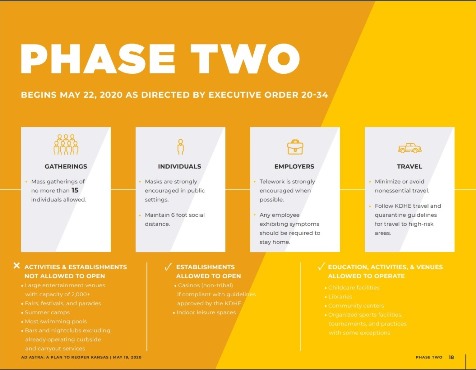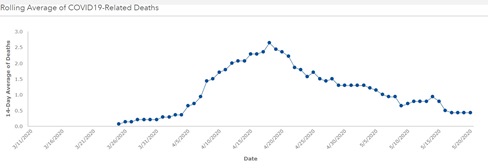


Wyandotte County will change to the governor’s reopening plan, according to an announcement today from the Unified Government Health Department.
Phase 2 of the governor’s Ad Astra reopening plan will go into effect in Wyandotte County at midnight on May 21 (between Thursday and Friday), and will be in effect all day Friday and thereafter, according to a spokesman.
The decision to switch from the ReStart WyCo plan to the governor’s plan was made because the Wyandotte County health data are trending better and also to minimize confusion, said Janell Friesen, spokesman for the UG Health Department.
She said COVID-19 death trends in particular have decreased in recent weeks. Hospitalization rates also have generally decreased in Wyandotte County.
Different policies of reopening throughout the metropolitan area may have confused residents. Local leaders believe they can minimize potential confusion by aligning Wyandotte County with the state’s guidelines, she said.
The governor announced on Tuesday that the state would move into a modified Phase 2 early, on Friday, May 22.
Friesen said COVID-19 is still a threat to the community, and residents are asked to continue to do social distancing, wear masks, wash and sanitize hands, to help reduce the threat.
Under Phase 2 of the governor’s plan, residents must avoid groups of more than 15 individuals indoors and out, Friesen said, especially if they are not able to keep a distance of at least 6 feet.
Bars and nightclubs cannot reopen under Phase 2, they are only allowed to do curbside or carryout.
But restaurants and dining establishments can be open if they meet certain restrictions, including keeping 6 feet between customers, individuals and groups, she said. Those in the same household may sit together.
Restaurants may use physical barriers between customers to help with that, and provide additional cleaning, with guidance to restaurants available on the state’s reopening website. According to the Phase 2 plan, businesses must avoid instances where more than 15 individuals are in one location and unable to maintain 6 feet of distance, with more information at https://covid.ks.gov/wp-content/uploads/2020/05/Reopen-Kansas-Framework-v6.2-5.19.20.pdf.
Personal services such as hair salons and barbershops can reopen under Phase 2, also, if everyone follows guidelines including wearing masks and keeping the number of customers to a limited amount.
Retail stores, such as those at The Legends Outlets and others throughout the county, could reopen under Phase 2 if they maintain social distancing and maintain standards for cleaning the facilities, she said. They would have to make sure employees are not coming to work when sick, she added. Those who are going out in public are asked to wear masks, which could include homemade cloth masks, she added.
State-owned casinos such as the Hollywood Casino may reopen under the governor’s plan if they comply with guidelines approved by the Kansas Department of Health and Environment.
However, it is too soon to reopen Children’s Mercy Park to fully attended Sporting KC soccer games. Venues with more than 2,000 people in attendance are not yet allowed to open. That attendance number would also apply to the Kansas Speedway.
Some other sports activities, such as local youth teams and nonprofessional sports, will be allowed to hold practices and games if they follow guidelines in the plan that are posted at the state’s COVID-19 website, she said.
Libraries and community centers may reopen under Phase 2.
K-12 education remains under the same guidelines as previously, including continuous learning, except that up to 15 persons may be present for normal operations. Licensed child care facilities may reopen.
According to Phase 2, higher education facilities that were closed before May 4 should remain closed for in-person learning or events involving groups of more than 15 people present at a time.
Swimming pools are still closed under the governor’s plan. Summer camps also do not open in Phase 2.
Telework, or working from home, is still encouraged in Phase 2, when possible.
According to the state’s COVID-19 website, on Memorial Day, people may have social gatherings of 15 or fewer people at their residence. They can go to parks as long as they maintain social distancing.
Phase 2 of the governor’s plan is generally thought to be similar to the Wyandotte County’s “yellow zone.”
In a statement released today, Wyandotte County’s chief medical officer, Dr. Allen Greiner, said, “The residents and businesses of Wyandotte County have made significant progress in reducing transmission of COVID-19 and flattening the curve. The local data supports further reopening of our community, and the Governor’s Phase 2 plan strikes the appropriate balance between public health and economic activity at this time. To keep things under control, we urge everyone to wear masks, practice social distancing, and wash hands frequently.”
According to a spokesman, the temporary suspension of the ReStart WyCo plan and adoption of the state Phase 2 plan will make it easier for residents and businesses to comply with guidance to keep patrons and families safer. The state’s Phase 2 plan is at covid.ks.gov.
“I’m pleased that Wyandotte County is continuing to gradually reopen parts of our community and the economy,” Mayor-CEO David Alvey of the Unified Government, said. “Our public health officials have consistently promoted the safety and health of our community since the outbreak of COVID-19. Their decision to suspend the ReStart WYCO Plan and align with the State of Kansas’ 2 Plan released yesterday was based on data showing that Wyandotte County continues to slow the spread, an effort to provide consistency and uniformity to residents and businesses confused by the current mix of state and local guidelines, and the fact that State prescribed guidelines supersede local authority.”
“However, it’s important to recognize that we have only slowed, not stopped, the spread of this virus,” Mayor Alvey continued. “We must follow through on recommendations to maintain social distancing, wash our hands, and wear masks in public, as these practices will further reduce the threat to public health and our most vulnerable populations, while allowing health officials to relax restrictions on business and personal activities at the most appropriate time.”
Residents encouraged to reduce exposure to COVID-19
Even though the Kansas Phase 2 plan allows for further loosening of restrictions on individuals and businesses, COVID-19 remains a threat in Wyandotte County, according to a spokesman. If businesses can continue to operate remotely, they are strongly encouraged to do so. The COVID-19 virus is still present in our community, and minimizing exposure by working remotely continues to be a recommended strategy for limiting its spread.
Vulnerable populations, including people over 60 years old, individuals who are immune-compromised, or who have underlying medical conditions should avoid close contact with others by practicing social distancing as much as is possible. The Public Health Department recommends wearing a mask or face-covering in public.
Under the Kansas Phase 2 plan, mass gatherings (where individuals are in one location and cannot maintain proper social distancing) of more than 15 people are prohibited. Other guidance of the Kansas Phase 2 plan include:
• Individuals are encouraged to wear masks in public settings.
• When in public, people should maintain at least 6 feet of distance between themselves and others (not including people who reside together).
• Businesses can open if they can maintain at least 6 feet of distance between consumers.
• Restaurants or dining establishments can meet this requirement by using physical barriers to prevent the spread of virus between individual customers or groups of seated customers.
• Casinos (non-tribal) may re-open if they comply with uniform guidelines approved by the Kansas Department of Health and Environment.
• Most activities and venues may reopen as long as they can maintain at least 6 feet of distance between individuals or groups and follow proper cleaning and public health practices.
Exceptions to the activities and venues reopening:
• Outdoor and indoor entertainment venues with a capacity of 2,000 or more people
• Fairs, festivals, carnivals, and parades
• Summer camps
• Public swimming pools
• Bars and nightclubs excluding already operating curbside and carryout services
Public buildings to reopen May 26
Public buildings in Wyandotte County will reopen on Tuesday, May 26, by appointment only. To protect the health and wellness of visitors and employees, public buildings will reopen with restrictions, according to a spokesman. Visitors will be required to have their temperatures taken before being admitted. Visitors are also required to wear masks when entering a public building. Additional information will be provided later.
Residents or businesses with specific questions about doing business with a particular department should visit wycokck.org. Many services, like paying property taxes, renewing vehicle registration, or requesting a new traffic court date can be completed online. Residents, businesses, and visitors may also contact 3-1-1 for assistance.
County health officials will continue to monitor key data on the status of COVID-19 to determine next steps in the community’s re-opening process. Those metrics include:
• The number of hospitalizations and deaths in Wyandotte County and surrounding area hospitals over a 14-day period, and
• the percentage of positive tests over a 14-day period.
“The Unified Government Health Department and medical officers will continue to closely track the data and could, if the data goes in the wrong direction, move back to a more restrictive position,” Dr. Greiner said. “It is also possible that the Unified Government could stay in Phase 2 for longer than the state. It depends on what the data shows us in terms of whether COVID-19 continues to spread or if it’s contained in Wyandotte County.”
“Data points such as the 14-day moving average and total positive cases are moving in the right direction. It is important that we continue to expand testing across the community, and increase our contact tracing capacity. Testing and tracing are key components to managing the spread of COVID-19 and preventing a resurgence that could overwhelm the medical system,” said Juliann Van Liew, director of the Unified Government Health Department.
Residents with questions about the governor’s Phase 2 should contact 3-1-1 or visit at covid.ks.gov/ad-astra-a-plan-to-reopen-kansas. To learn more about the county’s COVID-19 response and access FAQs and information, visit wycokck.org/COVID-19.
The state’s Phase 2 plan is at covid.ks.gov.
The state plan’s frequently asked questions page is at https://covid.ks.gov/wp-content/uploads/2020/05/Reopening-FAQ_5.19.2020_Final.pdf
The state has an information page about what activities are safe on Memorial Day weekend, at https://covid.ks.gov/wp-content/uploads/2020/05/Safe-Memorial-Day-Guidance-5.19_Final.pdf
Additional guidelines from the governor’s office about Phase 2 are at https://www.wycokck.org/WycoKCK/media/Health-Department/Documents/Communicable%20Disease/COVID19/AdAstraUpdate519.pdf.
The UG’s COVID-19 information page is at https://alpha.wycokck.org/Coronavirus-COVID-19-Information.
